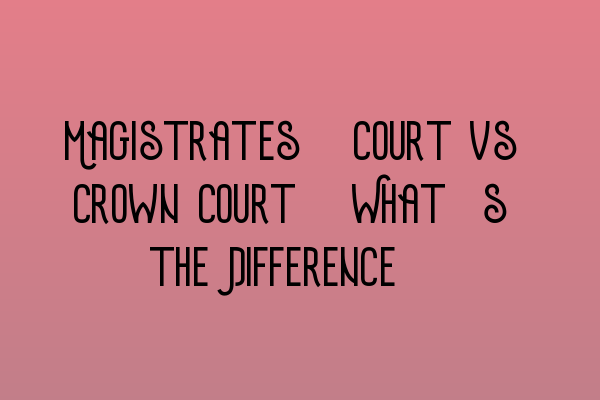Magistrates’ Court vs Crown Court: What’s the Difference?
When it comes to the criminal justice system in the United Kingdom, understanding the differences between the Magistrates’ Court and the Crown Court is essential. Whether you’re involved in a legal matter or simply interested in how the system operates, this article will provide an in-depth comparison of these two courts.
Magistrates’ Court
The Magistrates’ Court is the lower level of the criminal court system. It handles the majority of criminal cases, such as minor offenses and preliminary hearings for more serious cases. Magistrates, who are not legally qualified judges, preside over the proceedings and make decisions on guilt or innocence, as well as sentencing. They also have the power to grant bail and issue certain types of warrants.
If you find yourself involved in a criminal case, you may appear before the Magistrates’ Court first. It’s important to note that cases tried in the Magistrates’ Court are usually heard by a panel of three magistrates or a district judge, depending on the severity of the offense. Unlike the Crown Court, there is no jury present in the Magistrates’ Court.
Wondering what happens if you’re unhappy with the decision made by the Magistrates’ Court? In such cases, you have the right to appeal to the Crown Court. This allows for a full rehearing of the case where a judge and jury will determine the outcome. It’s worth mentioning that the Crown Court can also deal with more serious offenses that are directly committed to it without going through the Magistrates’ Court.
Crown Court
The Crown Court, on the other hand, is a higher level court in the criminal justice system. It handles more serious criminal cases, including indictable offenses such as murder, robbery, and rape. Cases are heard by a jury of 12 members, and a judge oversees the proceedings, providing guidance and ensuring fair trial procedures are followed.
In the Crown Court, the jury is responsible for deciding guilt or innocence, while the judge determines the appropriate sentence if a defendant is found guilty. This combination of a jury and judge ensures a fair and impartial decision-making process.
It’s important to note that cases can be transferred from the Magistrates’ Court to the Crown Court if they are deemed too serious for the Magistrates’ Court to handle. This can occur either because the offense is of an indictable nature or because the defendant has elected for trial by jury.
Conclusion
In summary, the Magistrates’ Court and the Crown Court have different roles within the criminal justice system in the UK. The Magistrates’ Court deals with minor offenses and preliminary hearings, while the Crown Court handles more serious criminal cases, often with a jury present. Understanding the distinction between these two courts can help you navigate the legal process more effectively.
If you’d like to learn more about other legal topics, check out these related articles:
- Demystifying the Solicitors Qualifying Examination Format
- LLC Formation Made Simple: Step-by-Step Guide for UK Entrepreneurs
- Business Regulations in the UK: A Comprehensive Overview
- Preparing for the SQE Exam: Strategies and Resources for Success
- SQE Workshops and Webinars: Accelerate Your Exam Preparation
Remember, understanding the legal system and having the right legal representation is crucial in ensuring a fair trial and achieving the best possible outcome. If you need assistance with your criminal case, contact SQE Criminal Law & Practice Law UK today for expert legal advice and representation.
